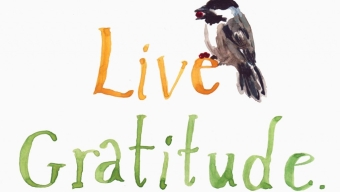The more often you focus his mind on things to be grateful for in his life, the more grateful and happy he will be.
Rather than thinking grumpily about what he hasn’t got, or what nasty things happened to him, he will begin to see things more and more in a joyful light.
A great opportunity could be when you have visited his grandmother, and she has done something nice for him, or given him a lovely birthday gift. No doubt you encourage your children to send a thank you note, or phone up Grandma to say thank you for the gift; but it could be fun to say something like this:
You really love the present Grandma gave you don’t you? She loves you so much. Wouldn’t it be nice to do something for Grandma? Would you like to make something for her? Got any ideas? = yes I am happy with my present, I would like to thank her = I can show my appreciation and gratitude
Discuss some ideas, like making her a photo of himself in a frame, making her a music CD from music you can download together from the internet, baking her some cookies, drawing her a picture, etc. = I can think of ideas for things that she would really like = I am good at thinking of ways to make others happy = I feel good about this
Together get what he needs together and work on his project, and while you are doing it talk about how excited and happy she is going to be. Ask him how he is going to deliver his surprise; suggest he calls her and tells her he has a surprise for her and that he will bring it over (make a time), or post it to her. He will be excited and pleased when he hears how thrilled she is, and how she is looking forward to her surprise. = thanking people is fun, giving to others is fun = this makes me feel joyful
Whether it’s a small or large project you undertake together to give time and effort to making someone else happy, he will experience the positive emotions of giving. He will become more thoughtful of others and happier as a consequence.





















